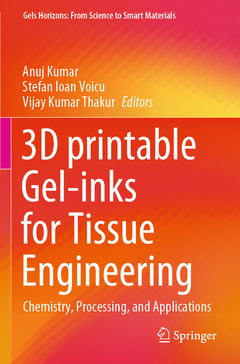Description
3D printable Gel-inks for Tissue Engineering, 1st ed. 2021
Chemistry, Processing, and Applications
Gels Horizons: From Science to Smart Materials Series
Coordinators: Kumar Anuj, Voicu Stefan Ioan, Thakur Vijay Kumar
Language: English
Subject for 3D printable Gel-inks for Tissue Engineering:
Keywords
Gels; Hydrogels; biomaterials; synthetic polymers; 3D printing
Publication date: 09-2022
395 p. · 15.5x23.5 cm · Paperback
Publication date: 09-2021
Support: Print on demand
Description
/li>Contents
/li>Biography
/li>Comment
/li>
This book provides the necessary fundamentals and background for researchers and research professionals working in the field of 3D bioprinting in tissue engineering. In 3D bioprinting, design and development of the biomaterial-inks/bio-inks is a major challenge in providing 3D microenvironments specific to anatomical and architectural demands of native tissues. The focal point of this book is to provide the basic chemistry of biomaterials, updates on current processing, developments, and challenges, and recent advancements in tissue-specific 3D printing/bioprinting. This book is will serve as a go-to reference on bioprinting and is ideal for students, researchers and professionals, working academia, government, the medical industry, and healthcare.
Dr. Anuj Kumar is an Assistant Professor at the School of Chemical Engineering, Yeungnam University, South Korea. He has received two sponsored research projects as Principal Investigator awarded by National Research Foundation (NRF) of Korea and one Indo-Korea joint research project as Co-Principal Investigator awarded by Korea Research Foundation (KRF, Korea) and Department of Science and Technology, India. He worked as a Postdoctoral Research Associate in the Department of Nano, Medical and Polymer Materials at Yeungnam University, South Korea and Assistant Professor in the Department of Chemistry at DIT University, India. He received his Ph.D. in Polymer Science and Engineering (Polymers & Biomaterials) in 2014 from Indian Institute of Technology (IIT) Roorkee, India. He received his M.Tech. (Fibre Science and Technology) in 2009 from IIT Delhi, India and M.Sc. (Organic Chemistry) in 2006 from Chaudhary Charan Singh University, India, respectively. He has published more than 50 SCI articles and 6 book chapters. He has rich experiences in the field of polymer/fibre science, lignocellulosic biomass, synthesis and processing of bio-based polymers, nanocelluloses, carbon nanomaterials, surface modification of polymers, polymeric composites/nanocomposites, chemistry and design of nanocomposite biomaterials, bioceramics and bioactive glasses, hybrid scaffolds and hydrogels, additive manufacturing (e.g., 3D printing/bioprinting), hybrid materials for cancer therapy, etc. His current research is focused on developing 3D printable hydrogels for various tissue engineering applications.
Dr. Stefan Ioan Voicu, Ph.D., (Habilitation) is a Professor at the Faculty of Applied Chemistry and Materials Science, Politehnica University of Bucharest and working in the Department of Analytical Chemistry and Environmental Engineering in the field of polymeric membrane materials and processes. He received his B.Sc. in Organic Chemistry, M.Sc. in Environmental En




